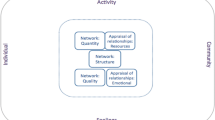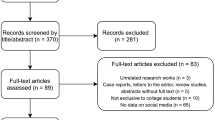Abstract
Purpose
Beliefs about other people’s potential views or reactions may be powerful determinants of mental health help-seeking behaviours. United Kingdom Armed Forces (UK AF) have made considerable efforts to promote appropriate help seeking though it is often suggested that military personnel remain reluctant to seek help. This study evaluated a novel stigma-reduction method, stand-up comedy, in service personnel.
Method
Personnel viewed a regular comedy show or a show containing mental health information. Pre, immediately post-show and 3 months later, military stigmatisation, potential discrimination, mental health knowledge, help-seeking and coping behaviour, talking about mental health, current mental health and alcohol use were measured.
Results
Response rates were 81.3 % pre-show, 67.6 % post-show and 18.9 % at follow-up. Inclusion of mental health material did not appear to detract from show satisfaction. Post-show, intervention group (IG) participants reported significantly less stigmatisation and accurately answered mental health-related questions; in the small numbers followed up, neither difference was maintained, however, IG personnel were statistically significantly more likely to discuss mental health and to advise others about mental health; adjusted analyses suggested that this was related to factors other than the show.
Conclusion
In UK AF personnel, embedding mental health awareness within a comedy show format had a short-term positive effect upon military stigmatisation regarding mental health. The low rate of follow-up limited our ability to assess whether this effect was durable. If the longevity of change can be adequately assessed and demonstrated in further research, comedy could potentially form a component of a comprehensive stigma-reduction strategy.


Similar content being viewed by others
References
Hotopf M, Hull L, Fear N, Browne T, Horn O, Iversen A, Jones M, Murphy D, Bland D, Earnshaw M, Greenberg N, Hacker-Hughes J, Tate R, Dandeker C, Rona R, Wessely S (2006) The health of UK military personnel who deployed to the 2003 Iraq war: a cohort study. Lancet 36:1731–1741
Fear NT, Jones M, Murphy D, Hull L, Iversen A, Coker B, Machell L, Sundin J, Woodhead C, Jones N, Greenberg N, Landau S, Dandeker C, Rona RJ, Hotopf M, Wessely S (2010) What are the consequences of deployment to Iraq and Afghanistan on the mental health of the UK armed forces: a cohort study. Lancet 375:1783–1797
Rona RJ, Hooper R, Jones M, Iversen AC, Hull L, Murphy D, Wessely S (2009) The contribution of prior psychological symptoms and combat exposure to post Iraq deployment mental health in the UK military. J Trauma Stress 22(1):11–19
Mulligan K, Jones N, Woodhead C, Davies M, Wessely S, Greenberg N (2010) Mental health of UK military personnel while on deployment in Iraq. Br J Psychiatry 197:405–410
Jones N, Burdett H, Wessely S, Greenberg N (2011) The subjective utility of early psychosocial interventions following combat deployment. Occup Med (Lond) 61(2):102–107
Greenberg N, Langston V, Iversen AC, Wessely S (2011) The acceptability of trauma risk management within the UK armed forces. Occup Med 61(3):184–218
Scott JN (2005) Diagnosis and outcome of psychiatric referrals to the Field Mental Health Team, 202 Field Hospital, Op Telic 1. J R Army Med Corps 151:95–100
McAllister PD, Blair SPR, Philpott S (2004) Op Telic—a field mental health team in the general support medical setting. J R Army Med Corps 50(2):107–112
Jones N, Fear NT, Jones M, Wessely S, Greenberg N (2010) Long-term military work outcomes in soldiers who become mental health casualties when deployed on operations. Psychiatry 73(4):352–364
Kim P, Thomas J, Wilk J, Castro C, Hoge C (2010) Stigma, barriers to care, and use of mental health services among active duty and National Guard soldiers after combat. Psychiatr Serv 61(6):582–588
Osório C, Jones N, Fertout M, Greenberg N (2013) Changes in stigma and barriers to care over time in UK Forces deployed to Afghanistan between 2008 and 2011. Mil Med (In Press)
Osório C, Jones N, Fertout M, Greenberg N (2012) Perceptions of stigma and barriers to care among UK military personnel deployed to Afghanistan and Iraq. Anxiety, Stress Coping. doi:10.1080/10615806.2012.725470 (ahead-of-print)
Woodhead C, Rona RJ, Iversen A, MacManus D, Hotopf M, Dean K, McManus S, Meltzer H, Brugha T, Jenkins R, Wessely S, Fear NT (2011) Mental health and health service use among post-national service veterans: results from the 2007 adult psychiatric morbidity survey of England. Psychol Med Psychol Med 41:363–372
Capeda-Benito A, Short (1998) P: self-concealment, avoidance of psychological services, and perceived likelihood of seeking professional help. J Couns Psychol 45:1–7
Iverson A, Staden L, Hughes JH, Greenberg N, Hotopf M, Rona RJ, Thornicroft G, Wessely S, Fear N (2011) The stigma of mental health problems and other barriers to care in the UK Armed Forces. Health Serv Res. doi:10.1186/1472-6963-11-31
(2010) Fighting fit: a mental health plan for servicemen and veterans. HMSO
Lloyd T (2002) Boys and young men’s health: what works. Health development agency, London
Jackson K (2003) Hurt until it laughs–an evaluation of Leicester comedy festival. Jackson consultancy, Leicester
Hoge CW, Castro CA, Messer SC, McGurk D, Cotting DI, Koffman RL (2004) Combat duty in Iraq and Afghanistan, mental health problems, and barriers to care. N Engl J Med 351:13–22
Mulligan K, Fear NT, Jones N, Alvarez H, Hull L, Naumann U, Wessely S, Greenberg N (2012) Postdeployment battlemind training for the U.K. armed forces: a cluster randomized controlled trial. J Consult Clin Psychol 80(3):331–341
Evans-Lacko S, Rose D, Little K, Flach C, Rhydderch D, Henderson C, Thornicroft G (2011) Development and psychometric properties of the reported and intended behaviour scale (RIBS): a stigma-related behaviour measure. Epidemiol Psychiatr Sci 20(3):263–271
Evans-Lacko S, Little K, Meltzer H, Rose D, Rhydderch D, Henderson C, Thornicroft G (2010) Development and psychometric properties of the mental health knowledge schedule. Can J Psychiatry 55(7):440–448
Iversen A, van Staden L, Hughes J, Browne T, Hull L, Hall J, Fear N (2009) The prevalence of common mental disorders and PTSD in the UK military: using data from a clinical interview-based study. BMC Psychiatry 9(1):68
Bush K, Kivlahan DR, McDonell MB, Fihn SD, Bradley KA (1998) The AUDIT alcohol consumption questions (AUDIT-C): an effective brief screening test for problem drinking. Arch Intern Med 158(16):1789
Goldberg DP, Gater R, Sartorius N, Ustun TB, Piccinelli M, Gureje O, Rutter C (1997) The validity of two versions of the GHQ in the WHO study of mental illness in general health care. Psychol Med 27:191–197
Goldberg D, Williams PA (1988) User’s guide to the general health questionnaire. NFER-Nelson, Windsor
Prins A, Ouimette P, Kimerling R, Cameron R, Hugleshofer D, Shaw-Hegwar J, Thrailkill A, Gusman FD, Sheikh JI (2004) The primary care PTSD screen (PC-PTSD): development and operating characteristics. Prim Care Psychiatry 9:9–14
(2007) National institute for health and clinical excellence behaviour change at population, community and individual levels. In: NICE public health intervention guidance 6 National Institute for health and clinical excellence, London
Fear NT, Iversen A, Meltzer H, Workman L, Greenberg N, Wessely S (2007) Patterns of drinking in the UK armed forces. Addiction 102(11):1749–1759
Mulligan K, Fear NT, Jones N, Wessely S, Greenberg N (2010) Psycho-educational interventions designed to prevent deployment-related psychological ill-health in armed forces personnel: a review. Psychol Med 41:673–678
Greenberg N, Langston V, Everitt B, Iversen A, Fear NT, Jones N, Wessely S (2010) A cluster randomized controlled trial to determine the efficacy of TRiM (Trauma Risk Management) in a military population. J Trauma Stress 23(4):430–436
Gould M, Greenberg N, Hetherton J (2007) Stigma and the military: evaluation of a PTSD psychoeducational program. J Trauma Stress 20(4):505–515
Borschmann R, Greenberg N, Jones N, Henderson RC (2014) Campaigns to reduce mental illness stigma in Europe: a scoping review. Die Psychiatr 11(1):43–50
Evans-Lacko S, Brohan E, Mojtabai R, Thornicroft G (2012) Association between public views of mental illness and self-stigma among individuals with mental illness in 14 European countries. Psychol Med 42(8):1741–1752
Corrigan PW, River LP, Lundin RK, Penn DL, Uphoff-Wasowski K, Campion J, Kubiak MA (2001) Three strategies for changing attributions about severe mental illness. Schizophr Bull 27(2):187–195
Evans-Lacko S, Malcolm E, West K, Rose D, London J, Rüsch N, Thornicroft G (2013) Influence of time to change’s social marketing interventions on stigma in England 2009–2011. Br J Psychiatry 202(s55):s77–s88
Acknowledgments
We are indebted to the service personnel who freely gave their time to take part in the study; to the Wellcome Trust and MoD for their financial support and to Headquarters Land Forces who enabled the study and without whom it could not have taken place.
Conflict of interest
N.G. and M.F. are full-time members of the UK Armed Forces. N.J. is a full-time reservist. All N.G., M.F. and N.J. are currently seconded to King’s College London. M.T. is employed by Surrey County Council and worked with the Academic Department for Military Mental Health to co-ordinate the study. T.J. is a UK Ministry of Defence employee. J.R. is an independent professional comedian who donated his time to the Academic Department for Military Mental Health for the duration of the study. Although the UK Ministry of Defence facilitated this study, it gave no direction in the gathering, analysing and presentation of data. The MoD provided funding for military personnel from an annual budget that includes provision for conducting military research.
Author information
Authors and Affiliations
Corresponding author
Rights and permissions
About this article
Cite this article
Jones, N., Twardzicki, M., Ryan, J. et al. Modifying attitudes to mental health using comedy as a delivery medium. Soc Psychiatry Psychiatr Epidemiol 49, 1667–1676 (2014). https://doi.org/10.1007/s00127-014-0868-2
Received:
Accepted:
Published:
Issue Date:
DOI: https://doi.org/10.1007/s00127-014-0868-2




